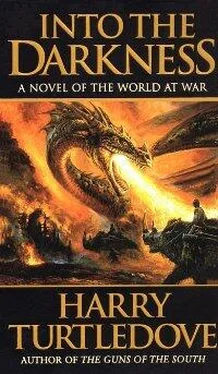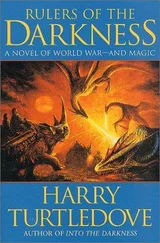Brivibas’s house was in the middle of the Kaunian section, on the west side of the village. Not all Kaunians in Oyngestun dwelt there, and a few Forthwegians lived among them, but for the most part each of the two peoples followed its own path through the world.
Here and there, the two folk did mix. When Vanai saw a tall, lean man with a dark beard or a fair-haired woman who was built like a brick, she pitied their Kaunian ancestors. In a village like Oyngestun, such mingling was rare. It was not common in Gromheort, either. In worldly—Brivibas called it decadent—Eoforwic, though, from what Vanai had heard, it was in some circles taken for granted.
“My grandfather,” she said suddenly as they went inside, “you could be a scholar at the King’s University, did you so choose. Why have you been content to stay here in Oyngestun all your days?”
Brivibas stopped so abruptly, she almost ran into him. “Why?” he said, perhaps as much to himself as to Vanai. After a considerable pause for thought, he went on, “Here, at least, I know the Forthwegians who dis- ;like me because I have light hair. In the capital, I would ever be taken by surprise. Some surprises are delightful. Some, like that one, I would sooner do without.”
At first, Vanai thought that was the most foolish answer she’d ever heard. The longer she thought about it, though, the more sense it made.
All things considered, Istvan could have liked the island of Obuda. The weather was mild, or at least he thought so: having grown up in the domain of the Hetman of Zalaber in central Gyongyos, his standards of comparison were not stringent. The soil was rich—again, by his standards. He did not mind military discipline; his father had clouted him harder than his sergeant did. The Obudans were friendly, the women often delightfully so. They said they preferred Arpad, the Ekrekek of Gyongyos, to the Seven Princes of Kuusamo as their overlord.
When Istvan remarked on that in the barracks one morning, Sergeant Jokai laughed at him. “They’re whores, is what they are,” Jokai said. “Two years ago, before we bounced the Kuusamans off this rock, you’d better believe the natives were telling them how wonderful they were, too.”
“It could be, I suppose,” Istvan said.
“Could be, nothing—it is.” Jokai spoke with great assurance. “And if those slant-eyed whoresons throw us off of here again, the Obudans’ll tell ’em what great heroes they are. And if any of our boys didn’t get away, they’ll tell the Kuusamans where they’re hiding.”
Arguing with a sergeant wasn’t smart, not unless you were fond of latrine detail. Istvan wasn’t. He poured down his morning beer—that was brought from home, for the stuff the natives brewed wasn’t fit to drink; it was, in his view, barely fit for removing varnish—and went outside.
The barracks lay just outside of Sorong, the biggest town on the island, which didn’t boast more than three, plus a couple of smaller villages. Sorong was halfway up a hill the Obudans called Mount Sorong. That made Istvan want to laugh. If the natives ever saw a real mountain, like the ones that towered above his own home village, they’d take that name and throw it into the sea: the stubby little hill didn’t come close to deserving it.
But, since it was the highest ground on Obuda, though, Istvan could see a long way from where he stood. Down below were small patches of timber and long stretches of wheat and barley fields and vegetable gardens. Out past them, the surf rolled up the beach, then slid back down again.
Istvan had never seen the ocean before he went into the army. Its immensity fascinated him. He could spy a couple of other islands, blue and misty in the distance. Otherwise, the water went on forever: or as far as his eye could reach, which amounted to the same thing. He was used to looking up if he wanted to see the sky, not straight out.
When he did look up, he spied a couple of dragons circling overhead, so high that, even with their enormous wingspans, they seemed only dots, midges seen at arm’s length. They floated as high as any of the peaks serrating the skyline back home. Up there, the air got cold and thin. The fliers swaddled themselves in furs and leather, the way hunters did when they went after snow leopards or marauding mountain apes.
His reveries were rudely interrupted when Sergeant Jokai came out behind him. Sergeants were unlikely to know any other way to interrupt a reverie. “Time on your hands, eh?” Jokai said. “That’s a shame. That’s a crying shame. Why don’t you go police the dragon pens? The scouts won’t be back for a while, that’s plain.”
“Have a heart, Sergeant,” Istvan pleaded.
He might as well have asked for the moon. “Go draw your leathers and go get to work,” Jokai said implacably. He hated idleness in any form. Poor Istvan hadn’t yet perfected the art of looking busy even when he wasn’t.
Cursing under his breath, he went over to the dragon pens—at the prescribed brisk march, because Jokai was watching—and pulled on elbow-length leather gauntlets and leather shin protectors that fit over the tops of his shoes. He grabbed a rake and a broom and a pail.
Turul, the head dragonkeeper, chuckled as Istvan donned the protective gear. “And how did you win the prize?” he asked.
“I was breathing,” Istvan answered bitterly.
Turul chuckled again. “Don’t do too much of that while you’re working, or you’ll be sorry afterwards.”
“I’m already sorry,” Istvan said. All that did was make the dragon-keeper laugh louder than ever. Istvan himself was something less than amused. Mucking out after horses or unicorns was nasty, smelly work. Mucking out after dragons was nasty, smelly, dangerous work.
He shoveled dung and raked foul straw, doing his best not to let any of the fetid stuff—and it was far more fetid than what horses and unicorns produced—touch bare skin. The brimstone and quicksilver dragons ate along with their meat made their wastes not just odorous but corrosive. They also made their wastes toxic, for those who dealt with them over years. Mad as a dragonkeeper was a common expression, but not one Istvan had the nerve to use around Turul.
Istvan cursed when a couple of drops of dragon piss splashed up and caught him on the arm above the gauntlet. The stuff burned like acid. It was acid. He snatched up some clean straw from a corner of the pen and scrubbed it off. It left behind a nasty red welt.
A copper-skinned Obudan boy watched him, wide-eyed. Dragons fascinated the locals. Even wild ones were rare all through the long reach of islands between Kuusamo and the western mainland of Derlavai. None of the islanders had ever imagined taming them. That a man could ride one high into the heavens left the locals astonished and awed.
No matter how astonished and awed they were, Istvan didn’t feel like being watched right now. He grabbed a ball of dragon dung with his gauntleted hand and made as if to throw it at the Obudan boy. The boy fled, shrieking with laughter.
Istvan laughed a little himself, some of his good humor restored. He brought the tools back to Turul and dumped the contents of the pails in a special slit trench that had been dug even farther away from the streams than the Gyongyosian soldiers’ latrines. Then, with a sigh of relief, he stripped off the gauntlets and the shin protectors and hung those up, too.
He hadn’t even started to walk away when he saw one of the scout dragons spiralling down toward a pen he had just cleaned. He shook his fist at the great beast. “If you shit in there again, you can clean it up yourself,” he called. Turul thought that was pretty funny. Istvan didn’t. He meant it from the bottom of his heart.
Читать дальше












